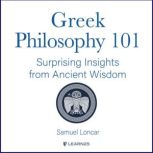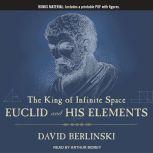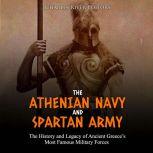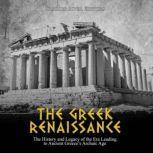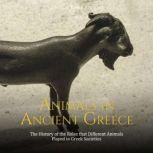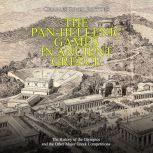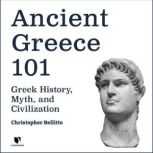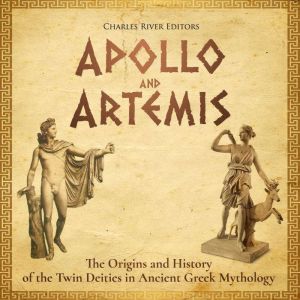
Details
Apollo and Artemis: The Origins and History of the Twin Deities in Ancient Greek Mythology
Author: Charles River Editors
Narrator: Cathy Barnes
Unabridged: 2 hr 33 min
Format: Digital Audiobook
Publisher: Findaway Voices
Published: 04/09/2023
Genre: History - Ancient - Greece
Synopsis
“Apollo’s history is a confusing one,” said the renowned poet and mythologist Robert Graves. This notion is also illustrated in the above quote from the 6th century BCE Homeric Hymn to Apollo, which gives the reader a brief glimpse into the confusion surrounding Apollo’s multi-faceted nature. The quote comes from the end of an episode in which Apollo is traversing the known world, looking for a place to build a temple to himself. Once he lands upon a place of his liking, however, he realizes that he needs to populate it with priests who would ‘guard’ and care for its ceremonies. Rather than depend upon those ‘glorious tribes’ to supply his temple with sycophants, Apollo has no patience for chance, and flies down to a Cretan merchant ship, landing on it in the form of a timber-shaking dolphin. After terrifying the merchants, he tells them that their lives in the sea trade are over, and they are to be priests at his temple from then on. Cautioning the merchants to eschew piracy and ‘keep righteousness’ in their hearts, while simultaneously confronting and sequestering them captures the youthful god’s capricious character quite well.
Artemis had one of the most widespread cults in the Greek world, perhaps due to her connection to nature, which can be a ubiquitous antagonist or boon-giver. Her association with nature may also explain why she was one of the oldest deities in the Greek pantheon, although her appearance in the Mycenaean Linear B script is still contested. Etymology often gives modern readers a better idea of the earliest form of a deity, but Artemis's is confusing. She is often associated with mythic qualities (such as "maidenhood" and "purity") and even non-Greek origins. The latter is as unsurprising as the former, since Artemis had a large following throughout Greece and across Asia Minor, where her most famous temple, one of the Seven Wonders of the World, resided. It was in the Near East where Artemis represented wilder characteristics.
by Samuel Loncar
Born in Athens, Greece, acclaimed Yale-educated philosopher Samuel Loncar helps you discover how ancient Greek philosophy—or “love of wisdom”—forms powerful bridges between East and West as well as past and present...
Published: 10/27/2020
by David Berlinski
Geometry defines the world around us, helping us make sense of everything from architecture to military science to fashion. And for over two thousand years, geometry has been equated with Euclid's Elements, arguably the most influential book in the ...
Published: 04/15/2013
by Charles River Editors
“Forward, sons of the Greeks,Liberate the fatherland,Liberate your children, your women,The altars of the gods of your fathers,And the graves of your ancestors: Now is the fight for everything.” – The Greek battle hymn sung before ...
Published: 04/19/2019
by Charles River Editors
In today’s modern world every political regime, even the most authoritarian or repressive, describes itself as democracy or a Democratic People’s Republic. The concept of rule by the people, on behalf of the people, has come to be accept...
Published: 01/30/2020
by Llewelyn Morgan
"Vivam" is the very last word of Ovid's masterpiece, the Metamorphoses: "I shall live." If we're still reading it two millennia after Ovid's death, this is by definition a remarkably accurate prophecy. Ovid was not the only ancient author with aspir...
Published: 12/01/2020
by Charles River Editors
The Greek Dark Ages, sometimes referred to as the Homeric Age or the Geometric Period, spans the era of Greek history from the end of the Mycenaean civilization around 1100 BCE and the emergence of the Greek poleis in the 9th century BCE. It is an ...
Published: 10/13/2020
by Charles River Editors
To many in the ancient world, their gods and goddesses were all around them and could be seen daily in nature, which meant that nearly every kind of animal, both domestic and wild, was associated with a god or goddess. In places like Egypt and Gree...
Published: 09/13/2021
by Charles River Editors
The Pan-Hellenic Games is the collective term for the four major sports festivals held in ancient Greece. These include the Olympic Games, held in honor of Zeus at Olympia every four years; the Pythian Games in honor of Apollo, held at Delphi every...
Published: 03/25/2020
by Christopher M. Bellitto
Join award-winning historian Christopher Bellitto on this gripping journey through centuries of Greek history. Ancient Greece was one of the most fertile civilizations in history, and its influence on Western philosophy, theology, and civilization ...
Published: 09/14/2012

